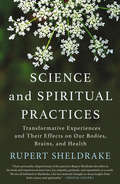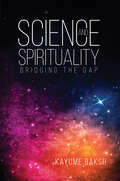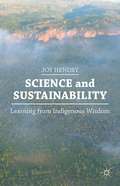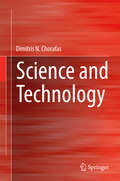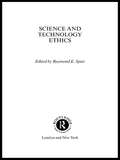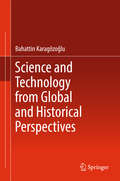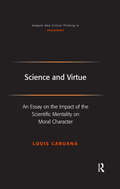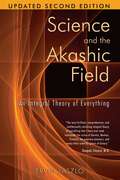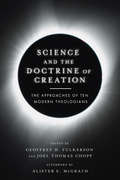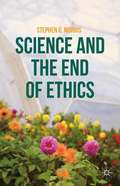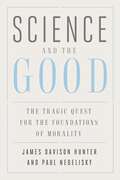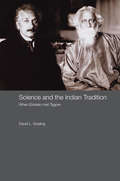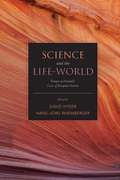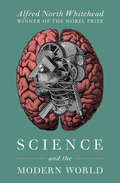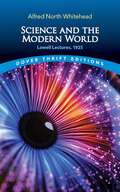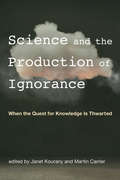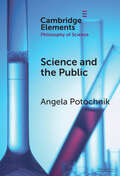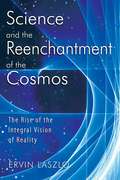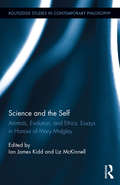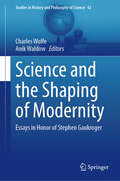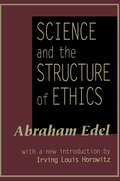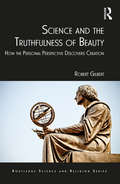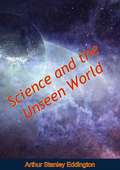- Table View
- List View
Science and Spiritual Practices: Reconnecting through direct experience
by Rupert SheldrakeIn this pioneering book Rupert Sheldrake shows how science helps validate seven practices on which all religions are built, and which are part of our common human heritage:· Meditation· Gratitude· Connecting with nature· Relating to plants· Rituals· Singing and chanting· Pilgrimage and holy places. The effects of spiritual practices are now being investigated scientifically as never before, and many studies have shown that religious and spiritual practices generally make people happier and healthier. Rupert Sheldrake summarizes the latest scientific research on what happens when we take part in these practices, and suggests ways that readers can explore these fields for themselves. For those who are religious, Science and Spiritual Practices will illuminate the evolutionary origins of their own traditions and give a new appreciation of their power. For the non-religious, this book will show how the core practices of spirituality are accessible to all, even if they do not subscribe to a religious belief system. This is a book for anyone who suspects that in the drive towards radical secularism, something valuable has been left behind. Rupert Sheldrake believes that by opening ourselves to the spiritual dimension we may find the strength to live more wholesome and fulfilling lives.
Science and Spiritual Practices: Transformative Experiences and Their Effects on Our Bodies, Brains, and Health
by Rupert Sheldrake"I have personally adopted many of the practices Rupert describes in his book and experienced more love, joy, empathy, gratitude, and equanimity as a result. We are all indebted to Rupert, who has tirelessly brought us deep insights from both science and spirituality.&” ―Deepak ChopraThe effects of spiritual practices are now being investigated scientifically as never before, and many studies have shown that religious and spiritual practices generally make people happier and healthier. In this pioneering book, Rupert Sheldrake shows how science helps validate seven practices on which many religions are built, and which are part of our common human heritage: meditation, gratitude, connecting with nature, relating to plants, rituals, singing and chanting, and pilgrimage and holy places.Sheldrake summarizes the latest scientific research on what happens when we take part in these practices, and suggests ways that readers can explore these fields for themselves. For those who are religious, Science and Spiritual Practices will illuminate the evolutionary origins of their own traditions and give a new appreciation of their power. For the nonreligious, this book will show how the core practices of spirituality are accessible to all.This is a book for anyone who suspects that in the drive toward radical secularism, something valuable has been left behind. Rupert Sheldrake compellingly argues that by opening ourselves to the spiritual dimension, we may find the strength to live more fulfilling lives.
Science and Spirituality
by Kayume BakshThis book provides a fascinating, well-researched, and thorough discussion of the connections between science and spirituality, including religion. It is eye-opening and allows readers to truly redefine how they look at these disciplines while providing, at the same time, a vibrant perspective for those embarking on such an exercise for the first time.Science investigates the physical world, where space, time, and matter comprise the main aspects of its empirical approach, that is, of physically proving all that there is around us. Spirituality goes beyond the physical. Here, physical quantities become non-existent and so our connections are perceived through seemingly nonrational (but hardly irrational) unscientific means. Religion is rendered useless as a way of explaining how the universe works. Quantum mechanics, an integral part of modern physics, is helping to bring about a closer convergence by showing remarkable similarities between advanced scientific observations and what has been taught for centuries in the wisdom traditions, known as spirituality. This insightful information continues to amaze us like none before.We, therefore, now have the right combination and evidence to show why the gap between science and spirituality must be bridged so that we can finally embrace the answers to mysterious questions about the universe and life. This thought-provoking book provides the details you need.We stand on the verge of heralding a new paradigm or, rather, a metaparadigm – the mother of all paradigms – one that unfolds a new vision of reality that includes consciousness for the first time, not excludes it – as science still does.Whether you belong to a religion or not, are a spiritualist, an atheist, an agnostic, or just curious about the universe and life, this book is for you.
Science and Sustainability
by Joy HendryIndigenous science is often dismissed as quackery or nonsense, out of touch with progress and current events. However, Indigenous peoples have passed down vital information for generations, from which local plants help cure common ailments, to which parts of the land are unsuitable for buildings because of likely earthquakes. These scientific practices that have been developed by Indigenous peoples around the world have been largely ignored by Western colonizers in their lands. From Japan and New Zealand to Australia and Canada, Indigenous science involves environmentally-focused, sustainable practices that allow people to live with the land rather than in spite of it. Here, Hendry examines science through these Indigenous roots, problematizing the idea that Western science is the only type that deserves that name and drawing attention to some of its shortcomings. She takes the reader with her on the learning process and shares a myriad of sustainable examples that can be put into practice.
Science and Technology
by Dimitris N. ChorafasThe aim of this book is to explore science and technology from the viewpoint of creating new knowledge, as opposed to the reinterpretation of existing knowledge in ever greater but uncertain detail. Scientists and technologists make progress by distinguishing between what they regard as meaningful and what they consider as secondary or unimportant. The meaningful is dynamic; typically, the less important is static. Science and technology have made a major contribution to the culture and to the standard of living of our society. From antiquity to the present day, the most distinguished scientists and technologists have been thinkers, experimenters and persons willing and able to challenge "the obvious". Technology develops products and processes based on the breakthroughs of science. If technologists fail to steadily upgrade their skills, tools and methods, they will only be as good as their last design, risking obsolescence. Using practical examples and case studies, this book documents the correlations existing between science and technology, and elucidates these correlations with practical applications ranging from real-life situations, from R&D to energy production. As it is a salient problem, and a most challenging one to our society, power production has been chosen as a major case study. The holistic approach to science and technology followed by this text enhances the ability to deliver practical results. This book is intended for students and researchers of science, technology and mathematical analysis, while also providing a valuable reference book for professionals. Its subject is one of the most debated problems of mankind.
Science and Technology Ethics (Professional Ethics)
by Dr Raymond E.Spier Raymond E. SpierScience and Technology Ethics re-examines the ethics by which we live and asks the question: do we have in place the ethical guidelines through which we can incorporate these developments with the minimum of disruption and disaffection? It assesses the ethical systems in place and proposes new approaches to our scientific and engineering processes and products, our social contacts, biology and informatics, the military industry and our environmental responsibilities. The volume is multidisciplinary and reflects the aim of the book to promote a state of the art assessment of these issues. Science and Technology Ethics is a much-needed discussion of the scientific developments that have major effects on the way we live. It will be of interest to all students of science and technology and all professionals involved with administrating laws in these fields.
Science and Technology from Global and Historical Perspectives
by Bahattin KaragözoğluThis book provides science and technology ethos to a literate person. It starts with a rather detailed treatment of basic concepts in human values, educational status and domains of education, development of science and technology and their contributions to the welfare of society. It describes ways and means of scientific progresses and technological advancements with their historical perspectives including scientific viewpoints of contributing scientists and technologists. The technical, social, and cultural dimensions are surveyed in relation to acquisition and application of science, and advantages and hindrances of technological developments. Science and Technology is currently taught as a college course in many universities with the intention to introduce topics from a global historical perspective so that the reader shall stretch his/her vision by mapping the past to the future. The book can also serve as a primary reference for such courses.
Science and Values: An Essay on the Aims of Science and Their Role in Scientific Debate
by Larry LaudanLaudan constructs a fresh approach to a longtime problem for the philosopher of science: how to explain the simultaneous and widespread presence of both agreement and disagreement in science. Laudan critiques the logical empiricists and the post-positivists as he stresses the need for centrality and values and the interdependence of values, methods, and facts as prerequisites to solving the problems of consensus and dissent in science.
Science and Virtue: An Essay on the Impact of the Scientific Mentality on Moral Character (Ashgate New Critical Thinking in Philosophy)
by Louis CaruanaCharting new territory in the interface between science and ethics, Science and Virtue is a study of how the scientific mentality can affect the building of character, or the attainment of virtue by the individual. Drawing on inspiration from virtue-ethics and virtue-epistemology, Caruana argues that science is not just a system of knowledge but also an important factor determining a way of life. This book goes beyond the normal strategy evident in the science-ethics realm of examining specific ethical dilemmas posed by scientific innovations. Here Caruana deals with more fundamental issues, uncovering morally significant tendencies within the very core of the scientific mentality and explaining how science, its method, history and explanatory power can shape a conception of the good life.
Science and the Akashic Field: An Integral Theory of Everything
by Ervin LaszloPresents the unifying world-concept long sought by scientists, mystics, and sages: an Integral Theory of Everything • Explains how modern science has rediscovered the Akashic Field of perennial philosophy • New edition updates ongoing scientific studies, presents new research inspired by the first edition, and includes new case studies and a section on animal telepathy Mystics and sages have long maintained that there exists an interconnecting cosmic field at the roots of reality that conserves and conveys information, a field known as the Akashic record. Recent discoveries in vacuum physics show that this Akashic Field is real and has its equivalent in science’s zero-point field that underlies space itself. This field consists of a subtle sea of fluctuating energies from which all things arise: atoms and galaxies, stars and planets, living beings, and even consciousness. This zero-point Akashic Field is the constant and enduring memory of the universe. It holds the record of all that has happened on Earth and in the cosmos and relates it to all that is yet to happen. In Science and the Akashic Field, philosopher and scientist Ervin Laszlo conveys the essential element of this information field in language that is accessible and clear. From the world of science he confirms our deepest intuitions of the oneness of creation in the Integral Theory of Everything. We discover that, as philosopher William James stated, “We are like islands in the sea, separate on the surface but connected in the deep.”
Science and the Doctrine of Creation: The Approaches of Ten Modern Theologians
by Alister E. McGrathKevin J. Vanhoozer on T. F. TorranceKatherine Sonderegger on Karl BarthCraig G. Bartholomew on Abraham KuyperChristoph Schwöbel on Wolfhart Pannenberg
Science and the End of Ethics
by Stephen G. MorrisScience and the End of Ethics examines some of the most important positive and negative implications that science has for ethics. On the basis of strong scientific reasons for abandoning traditional notions of right and wrong, it endorses a new ethical approach that focuses on achieving some of the key practical goals shared by ethicists.
Science and the Good: The Tragic Quest for the Foundations of Morality (Foundational Questions in Science)
by James Davison Hunter Paul NedeliskyWhy efforts to create a scientific basis of morality are neither scientific nor moral: &“Important and timely.&”—The Wall Street Journal In this illuminating book, James Davison Hunter and Paul Nedelisky trace the origins and development of the centuries-long, passionate, but ultimately failed quest to discover a scientific foundation for morality. The &“new moral science&” led by such figures as E.O. Wilson, Patricia Churchland, Sam Harris, Jonathan Haidt, and Joshua Greene is only the newest manifestation of that quest. Though claims for its accomplishments are often wildly exaggerated, this new iteration has been no more successful than its predecessors. But rather than giving up in the face of this failure, the new moral science has taken a surprising turn. Whereas earlier efforts sought to demonstrate what is right and wrong, the new moral scientists have concluded, ironically, that right and wrong don&’t actually exist. Their (perhaps unwitting) moral nihilism turns the science of morality into a social engineering project. If there is nothing moral for science to discover, the science of morality becomes, at best, a feeble program to achieve arbitrary societal goals. Concise and rigorously argued, Science and the Good is a definitive critique of a would-be science that has gained extraordinary influence in public discourse today—and an exposé of that project&’s darker turn. &“Science and the Good is a closely argued, always accessible riposte to those who think scientific study can explain, improve or even supersede morality . . . A generous and thoughtful critique.&” —The Daily Telegraph
Science and the Indian Tradition: When Einstein Met Tagore (India in the Modern World #Vol. 3)
by David L. GoslingThis new text is a detailed study of an important process in modern Indian history. During the late nineteenth and early twentieth century, India experienced an intellectual renaissance, which owed as much to the influx of new ideas from the West as to traditional religious and cultural insights. Gosling examines the effects of the introduction of Western science into India, and the relationship between Indian traditions of thought and secular Western scientific doctrine. He charts the early development of science in India, its role in the secularization of Indian society, and the subsequent reassertion, adaptation and rejection of traditional modes of thought. The beliefs of key Indian scientists, including Jagadish Chandra Bose, P.C. Roy and S.N. Bose are explored and the book goes on to reflect upon how individual scientists could still accept particular religious beliefs such as reincarnation, cosmology, miracles and prayer. Science and the Indian Tradition gives an in-depth assessment of results of the introduction of Western science into India, and will be of interest to scholars of Indian history and those interested in the interaction between Western and Indian traditions of intellectual thought.
Science and the Life-World
by David Hyder Hans-Jörg RheinbergerThis book is a collection of essays on Husserl'sCrisis of European Sciencesby leading philosophers of science and scholars of Husserl. Published and ignored under the Nazi dictatorship, Husserl's last work has never received the attention its author's prominence demands. In theCrisis, Husserl considers the gap that has grown between the "life-world" of everyday human experience and the world of mathematical science. He argues that the two have become disconnected because we misunderstand our own scientific past-we confuse mathematical idealities with concrete reality and thereby undermine the validity of our immediate experience. The philosopher's foundational work in the theory of intentionality is relevant to contemporary discussions ofqualia, naive science, and the fact-value distinction. The scholars included in this volume consider Husserl's diagnosis of this "crisis" and his proposed solution. Topics addressed include Husserl's late philosophy, the relation between scientific and everyday objects and "worlds," the history of Greek and Galilean science, the philosophy of history, and Husserl's influence on Foucault.
Science and the Modern World: Lowell Lectures, 1925
by Alfred North WhiteheadThe famed mathematician and philosopher takes readers on a journey into a new scientific age, exploring topics from relativity to religion. Alfred North Whitehead, one of the great figures in the philosophy of science, wrote this prescient work nearly a century ago. Yet, in an era that has us reckoning with science and technology&’s place and meaning in our lives, it remains as relevant as ever. Science and the Modern World puts scientific discovery into historical and cultural context—exploring the effects of science and people on each other. &“It is a work not only of the first importance but also of great beauty. . . . Vivid writing.&” —Nature
Science and the Modern World: Lowell Lectures, 1925 (Dover Thrift Editions: Philosophy)
by Alfred North WhiteheadIn 1925, philosopher Alfred North Whitehead presented a series of eight lectures, delivering a groundbreaking exploration of the cultural and philosophical implications of scientific progress from the classical civilizations of the ancient world to the nineteenth century. One of the most influential thinkers of the twentieth century, Whitehead posits philosophy as a critical interpreter, illuminating science's hidden assumptions and bridging the gap between scientific findings and the evolving human experience. The lectures examined how scientific discoveries reshaped our perception of the physical world and redefined how we understand our place in the universe. Whitehead's insightful commentary remains a significant contribution to the ongoing dialogue between science and the humanities and prompts a holistic worldview, reflecting the interconnectedness of all aspects of existence. It is an essential read for those interested in the "process philosophy" of science.
Science and the Production of Ignorance: When the Quest for Knowledge Is Thwarted (The\mit Press Ser.)
by Martin Carrier Janet KouranyAn introduction to the new area of ignorance studies that examines how science produces ignorance—both actively and passively, intentionally and unintentionally.We may think of science as our foremost producer of knowledge, but for the past decade, science has also been studied as an important source of ignorance. The historian of science Robert Proctor has coined the term agnotology to refer to the study of ignorance, and much of the ignorance studied in this new area is produced by science. Whether an active or passive construct, intended or unintended, this ignorance is, in Proctor's words, “made, maintained, and manipulated” by science. This volume examines forms of scientific ignorance and their consequences.A dialogue between Proctor and Peter Galison offers historical context, presenting the concerns and motivations of pioneers in the field. Essays by leading historians and philosophers of science examine the active construction of ignorance by biased design and interpretation of experiments and empirical studies, as seen in the “false advertising” by climate change deniers; the “virtuous” construction of ignorance—for example, by curtailing research on race- and gender-related cognitive differences; and ignorance as the unintended by-product of choices made in the research process, when rules, incentives, and methods encourage an emphasis on the beneficial and commercial effects of industrial chemicals, and when certain concepts and even certain groups' interests are inaccessible in a given conceptual framework.ContributorsMartin Carrier, Carl F. Cranor, Peter Galison, Paul Hoyningen-Huene, Philip Kitcher, Janet Kourany, Hugh Lacey, Robert Proctor, Londa Schiebinger, Miriam Solomon, Torsten Wilholt
Science and the Public (Elements in the Philosophy of Science)
by Angela PotochnikScience is a product of society: in its funding, its participation, and its application. This Element explores the relationship between science and the public with resources from philosophy of science. Chapter 1 defines the questions about science's relationship to the public and outlines science's obligation to the public. Chapter 2 considers the Vienna Circle as a case study in how science, philosophy, and the public can relate very differently than they do at present. Chapter 3 examines how public understanding of science can have a variety of different goals and introduces philosophical discussions of scientific understanding as a resource. Chapter 4 addresses public trust in science, including responding to science denial. Chapter 5 considers how expanded participation in science can contribute to public trust of science. Finally, Chapter 6 casts light on how science might discharge its obligations to the public.
Science and the Reenchantment of the Cosmos: The Rise of the Integral Vision of Reality
by Ervin LaszloPresents a revolutionary new theory that bridges the divide between science and spirituality• Discloses the ramifications of non-localized consciousness and how the physical world and spiritual experience are two aspects of the same reality• Includes contributions from Jane Goodall, Ed Mitchell, Stanislav Grof, Ralph Abraham, and Christian de Quincy, among othersWhat scientists are now finding at the outermost frontiers of every field is overturning all the basic premises concerning the nature of matter and reality. The universe is not a world of separate things and events but is a cosmos that is connected, coherent, and bears a profound resemblance to the visions held in the earliest spiritual traditions in which the physical world and spiritual experience were both aspects of the same reality and man and the universe were one. The findings that justify this new vision of the underlying logic of the universe come from almost all of the empirical sciences: physics, cosmology, the life sciences, and consciousness research. They explain how interactions lead to interconnections that produce instantaneous and multifaceted coherence--what happens to one part also happens to the other parts, and hence to the system as a whole. The sense of sacred oneness experienced by our ancestors that was displaced by the unyielding material presumptions of modern science can be restored, and humanity can once again feel at home in the universe.
Science and the Self: Animals, Evolution, and Ethics: Essays in Honour of Mary Midgley (Routledge Studies in Contemporary Philosophy)
by Ian James Kidd Liz McKinnellMary Midgley is one of the most important moral philosophers working today. Over the last thirty years, her writings have informed debates concerning animals, the environment and evolutionary theory. The invited essays in this volume offer critical reflections upon Midgley’s work and further developments of her ideas. The contributors include many of the leading commentators on her work, including distinguished figures from the disciplines of philosophy, biology, and ethology. The range of topics includes the moral status of animals, the concept of wickedness, science and mythology, Midgley’s relationship to modern moral philosophy, and her relationship with Iris Murdoch. It also includes the first full bibliography of Midgley’s writings. The volume is the first major study of its kind and brings together contributions from the many disciplines which Midgley’s work has influenced. It provides a clear account of the themes and significance of her work and its implications for ongoing debates about our understanding of our place within the world.
Science and the Shaping of Modernity: Essays in Honor of Stephen Gaukroger (Studies in History and Philosophy of Science #62)
by Charles Wolfe Anik WaldowThis book collects a variety of short essays on Stephen Gaukroger’s thought, by leading scholars, both senior and junior. Stephen Gaukroger (1950–2023) was one of the preeminent specialists of early modern science and philosophy, particularly their interrelations including under the heading ‘natural philosophy’, on the international scene, since the 1980s, starting with his prominent Cartesian scholarship (and biography) and moving towards the formidable 4-volume series on science and the shaping of modernity (from Emergence of a Scientific Culture to Civilization and the Culture of Science), dealing not just with early modernity but with the Enlightenment, German Romanticism and 20th-century society. This volume covers the thought of this highly-recognized scholar and engages with his works covering early modern philosophy, enlightenment, and contemporary periods, making it a must-read for any philosopher and historian of science.
Science and the Structure of Ethics
by Abraham EdelInitially prepared as part of the Foundations of the Unity of Science volumes under the auspices of the International Encyclopedia of Unified Science, Science and the Structure of Ethics soon took on a life of its own. Well positioned in the naturalistic tradition of ethical theory extending from John Dewey at the start and Richard Rorty at the conclusion of the century, Abraham Edel's volume offers a remarkable synthesis of the ways hi which ethical statements can be examined, and the nature of ethical concerns.Edel reveals a singular capacity to move beyond oracular controversies of the good and the right hi favor of a comparative, analytic, and functional account of how ethical perspectives and practices affect the content of moral discourse. In Edel's work, the structure of ethical behavior is defined by biological, psychological, social, and historical functions. Hence a scientific account of ethics is possible since moral norms are themselves products of an experiential field open to verification procedures common to all other walks of human life.In reviewing the impact of Edel's work hi general, and this volume in particular, Irving Louis Horowitz notes that Edel's naturalistic emphasis fits neatly with a view of ethics as something grounded in human experience rather than mandated from divine assumption: "It is hard for me to imagine a turning back from the hard lessons of the century, any more in ethical theory than in empirical research as such. We owe a central place in our century's intellectual capital to Edel's examination of ethical doctrines in the light of changing circumstances." This is a work certain to enlist the interest of ethicists, sociologists of knowledge, as well as those concerned with issues hi the philosophy of science and religion alike.
Science and the Truthfulness of Beauty: How the Personal Perspective Discovers Creation (Routledge Science and Religion Series)
by Robert GilbertWhen scientists describe their results or insights as 'beautiful', are they using the term differently from when they use it of a landscape, music or another person? Science and the Truthfulness of Beauty re-examines the way in which seeing beauty in the world plays the key role in scientific advances, and argues that the reliance on such a personal point of view is ultimately justified by belief that we are made in the 'image of God', as Christian and Jewish believers assert. It brings a fresh voice to the ongoing debate about faith and science, and suggests that scientists have as much explaining to do as believers when it comes to the ways they reach their conclusions.
Science and the Unseen World
by Arthur Stanley EddingtonPhysicist and astronomer Arthur Eddington tested Einstein's Theory of Relativity at an eclipse in 1919. A lifelong Quaker, his 1929 Swarthmore Lecture explores how science and religion define and look at reality. ‘You will understand the true spirit neither of science nor of religion unless seeking is placed in the forefront.’ ‘He puts a strong line against simplistic reductionism in relation to our minds . He emphasizes that when we ask the question, “What are we to think of it all? What is it all about?,” the answer must embrace but not be limited to the scientific answer. His lecture explores this in a delightful way, that remains fully relevant today.’ — Prof. George Ellis 'The attitude of the scientist, here so admirably explained, is the attitude, also, of the mystic. Experience, to both, is what matters most.”’- The Sufi Quarterly, 1929.

